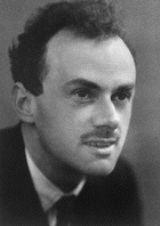
Paul Dirac
Paul Adrien Maurice Dirac (8 August 1902 – 20 October 1984) was a British theoretical physicist and a founder of the field of quantum physics.
Sourced
- The underlying physical laws necessary for the mathematical theory of a large part of physics and the whole of chemistry are thus completely known, and the difficulty is only that the exact application of these laws leads to equations much too complicated to be soluble. It therefore becomes desirable that approximate practical methods of applying quantum mechanics should be developed, which can lead to an explanation of the main features of complex atomic systems without too much computation.
- In science one tries to tell people, in such a way as to be understood by everyone, something that no one ever knew before. But in the case of poetry, it's the exact opposite!
-
-
- Anecdotally, when Oppenheimer was working at Göttingen, Dirac supposedly came to him one day and said: "Oppenheimer, they tell me you are writing poetry. I do not see how a man can work on the frontiers of physics and write poetry at the same time. They are in opposition. In science you want to say something that nobody knew before, in words which everyone can understand. In poetry you are bound to say... something that everybody knows already in words that nobody can understand."
- It seems that if one is working from the point of view of getting beauty in one's equations, and if one has really a sound insight, one is on a sure line of progress. If there is not complete agreement between the results of one's work and experiment, one should not allow oneself to be too discouraged, because the discrepancy may well be due to minor features that are not properly taken into account and that will get cleared up with further development of the theory.
- Scientific American (May 1963)
- One possibility in this direction is to regard, classically, an electron as the end of a single Faraday line of force. The electric field in this picture from discrete Faraday lines of force, which are to be treated as physical things, like strings. One has then to develop a dynamics for such a string like structure, and quantize it.... In such a theory a bare electron would be inconceivable, since one cannot imagine the end of a piece of string without having the string.
- Bombay Lectures (1955)
- "If we are honest—and scientists have to be—we must admit that religion is a jumble of false assertions, with no basis in reality. The very idea of God is a product of the human imagination. It is quite understandable why primitive people, who were so much more exposed to the overpowering forces of nature than we are today, should have personified these forces in fear and trembling. But nowadays, when we understand so many natural processes, we have no need for such solutions. I can't for the life of me see how the postulate of an Almighty God helps us in any way. What I do see is that this assumption leads to such unproductive questions as why God allows so much misery and injustice, the exploitation of the poor by the rich and all the other horrors He might have prevented. If religion is still being taught, it is by no means because its ideas still convince us, but simply because some of us want to keep the lower classes quiet. Quiet people are much easier to govern than clamorous and dissatisfied ones. They are also much easier to exploit. Religion is a kind of opium that allows a nation to lull itself into wishful dreams and so forget the injustices that are being perpetrated against the people. Hence the close alliance between those two great political forces, the State and the Church. Both need the illusion that a kindly God rewards—in heaven if not on earth—all those who have not risen up against injustice, who have done their duty quietly and uncomplainingly. That is precisely why the honest assertion that God is a mere product of the human imagination is branded as the worst of all mortal sins."
- Physics and Beyond: Encounters and Conversations (1971)
- It seems clear that the present quantum mechanics is not in its final form. Some further changes will be needed, just about as drastic as the changes made in passing from Bohr's orbit theory to quantum mechanics. Some day a new quantum mechanics, a relativistic one, will be discovered, in which we will not have these infinities occurring at all. It might very well be that the new quantum mechanics will have determinism in the way that Einstein wanted.
- in The early years of relativity, edited by
Quotes about Dirac
- If I understand Dirac correctly, his meaning is this: there is no God, and Dirac is his Prophet.
- Wolfgang Pauli
Misattribution
- In the fight between you and the world, back the world.
- Sourced to Franz Kafka, Betrachtungen (Reflections), Number 52, ca. 1917. See, for instance, Reflections on Sin, Suffering, Hope, and the True Way.
- If I understand Dirac correctly, his meaning is this: there is no God, and Dirac is his Prophet.
- in The early years of relativity, edited by
-
-
